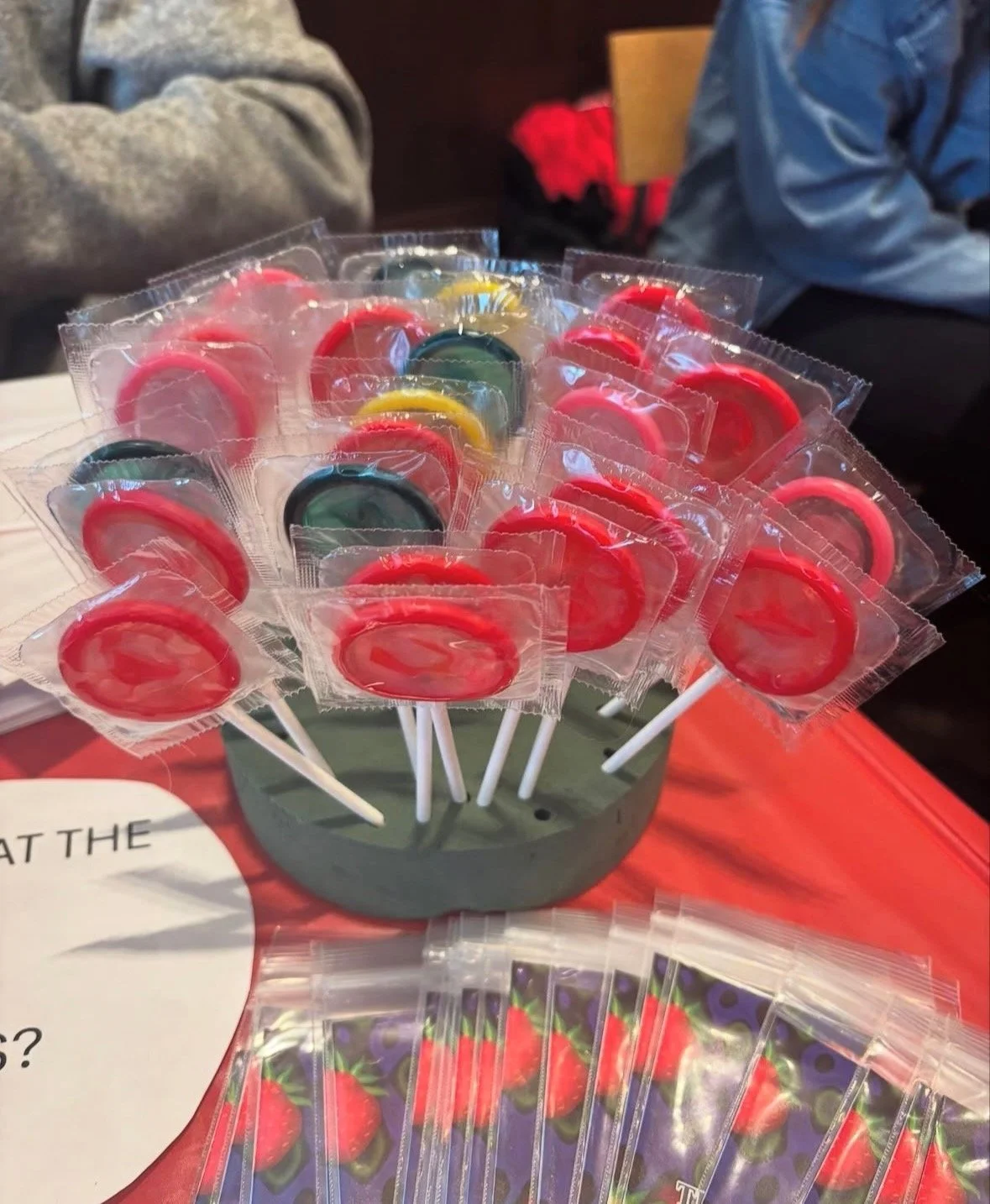The Sexual Health Carnival Returns After Six Years
Condom lollipops at the Sexual Health Carnival. Photo courtesy of Marist Counseling Services and Health Services.
Health is health.
While it’s a seemingly obvious statement, when it comes to sexual health, many people don’t view it as equal to other areas of health. Sexual health has an immense stigma that’s been deeply rooted in society; a stigma that Marist University continues to fight through events like the Sexual Health Carnival.
For the first time in over six years, Marist’s Health Services, in collaboration with various organizations, hosted a Sexual Health Carnival. With informational tables representing each organization stationed around the Cabaret, the carnival fostered a safe and relaxed environment for students to learn about sexual health and ask questions.
“Health Services provides sexual health education on an individual basis, every time a patient enters the room. However, as a group and in a very inviting and inclusive way, we'd like to educate the entire campus, not just those who are sick or coming with questions,” shared Marist nurse practitioner Kim Boral. “It's important to be reminded of how to stay safe and how to stay engaged.”
Between Health Services, Counseling Services, Nutrition Services, Title IX, Fox Pride, the Student Government Association, Family Services, Spiritual Life, Planned Parenthood and the Dutchess County Department of Health, it’s safe to say that students with questions or concerns would be able to work towards a solution with a representative from the various organizations.
Jay Land, from the Dutchess County Department of Health, shared, “I'm seeing that there are a lot of young people who don't have the right information on sexual health. Being aware of how to protect yourself from it is very important, especially on a college campus.”
While Health Services are always available to address students' concerns, they understand that it may not be easy to confront an adult and share very personal information with them. This event, featuring popcorn, prizes and even condom lollipops, provided students with an opportunity to learn about sexual health in a fun and welcoming atmosphere.
“We’re all in the same environment; we've all likely experienced similar things, and we can learn from each other,” shared a representative from the Title IX organization. “I think that when it came to creating this event, it was about coming together and bringing things that could both educate and make you feel heard.”
Without feeling ostracized or uncomfortable, students were able to go up to each table and speak with a representative, whether it be to learn about Opil, the first daily over-the-counter birth control pill, or to grab a few condoms to ensure protection against STIs and unwanted pregnancy.
“We're here to tell students that an over-the-counter birth control pill exists,” shared Isabelle Allen, a representative from Opil. “We're here spreading awareness to college students; it's a really convenient and accessible option. We're available at most major retailers as well as online at Amazon or opill.com.”
The variety of resources at the event was also evident; from condoms to birth control, each table offered a takeaway, either in the form of a physical object or essential knowledge.
Alexa Marino '27, a representative at the SGA table, said, “This event is important to make sure students are educated, they know what their options are and they understand how to be sexually safe, by also not just promoting abstinence.”
According to Planned Parenthood Action, only 39 states (and Washington D.C.) require that HIV and/or sex education be covered in school, with less than half requiring the information to be medically accurate. Additionally, more states ensure that sex education stresses abstinence rather than maintaining medical accuracy.
“Sexual health can be seen as taboo, especially queer sexual health,” said President of Fox Pride Victoria Cardone. “It’s a topic that people learn maybe once in high school, get a lecture from their parents, and that’s it. However, sexual health education, especially in college, is crucial.”
When it comes to sexual health awareness regarding LGBTQ+ identities and relationships, the disregard for advocacy becomes even more apparent, with only ten states requiring the discussion of this to be inclusive, and six states fully prohibiting the discussion of LGBTQ+ identities and relationships.
Cardone, who never learned about sexual health regarding LGBTQ+ relationships in high school, was thrilled that Fox Pride was represented in this event because queer sexual health is a topic that so many queer students are unfamiliar with.
“Being unable to access this crucial information easily can lead to detrimental health effects and unsafe sex practices,” she noted. “It can also really help breakdown the stigma about queer sexual health, such as the awful myth that only cis gay men can contract HIV/AIDS.”
Health Services also emphasized that they offer free and confidential STI testing and screening upon any student’s need.
“Everyone should have easy access to sexual health education,” Cardone said. “It’s just as important as any health education.”
